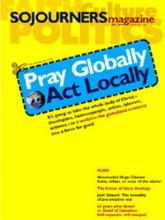Venezuela is a country where pocketsize constitutions are sold on the street corner, and old people and children carry dog-eared, sweat-soaked copies with them wherever they go.
"President Chávez is only passing through," says a member of a base Christian community in a barrio called Caricuao. "He is only a sojourner. It is the constitution that remains."
The new Venezuelan Constitution, constructed through a popular process and ratified through popular vote, combines the theological vision of the Latin American Catholic bishops at historic meetings in Medellín, Colombia, and Puebla, Mexico, with a populist political framework. In 1968, the bishops met in Medellín to examine the churchs role in social and political transformation in Latin America. Here the vision of a "preferential option for the poor," which had been rising up from the base for several years, was first clarified.
"The Lords distinct commandment to evangelize the poor," wrote the bishops at Medellín, "ought to bring us to a distribution of resources and apostolic personnel that effectively gives preference to the poorest and most needy sectors ."
The Medellín documents dealt with economic justice and development, anti-violence and peace, families, shifting social demographics, and the wealth and poverty of the church. They called for a social order where a person is not treated as an object, but as an agent of his or her own history. At Puebla, in 1979, the Latin American bishops renewed their commitment.
Read the Full Article
